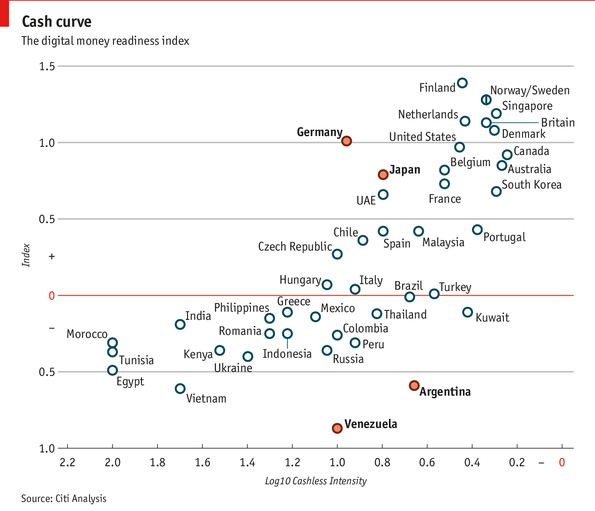from the Economist:
While a nightmare for numismatists, digital money makes payments faster, reduces the size of informal economies and makes flows of money more transparent. Even small increases in digital-money usage promises big benefits for governments and businesses, the report insists.
But that is not the most interesting part of the report. Generally speaking the countries that are best prepared for digital money tend to use less cash. In Belgium 93% of all consumer spending is by digital means, according to a report from Mastercard, another financial-services firm. Belgium also ranks highly on the Citi’s digital-money readiness index. Yet Citi’s report shows that even if a country is prepared to move to digital cash, its people may resist (see chart). For instance, although Germany’s digital money readiness is high, the “cashless intensity” of its economy is relatively low.

It is not just Germans love cash and coins: in Australia there are 166 ATMs per 100,000 people, according to World Bank data. Other countries, such as Finland, where there are only 35 ATMs per 100,000, are more high-tech financially. Venezuelans favour digital money due to security concerns and Argentinians because of inflation, whereas people in Japan are typically leery of credit-card debts. Japan, though miles more prepared for digital money than Venezuela, is actually a more cash-intensive economy than the Bolivarian Republic.
That cultural variety is rather nice. Moving to a cashless economy is sensible, at least in purely economic terms. Countries with big black economies and endemic corruption probably should not be sentimental about their dosh. But others’ attachment to their specie and notes should be welcomed. It can prompt public discussion about national heroes—see the debate last summer about who should be emblazoned on British money. And in some countries banknotes are little pieces of public art (see the lovely Swiss franc or the New Zealand dollar).
